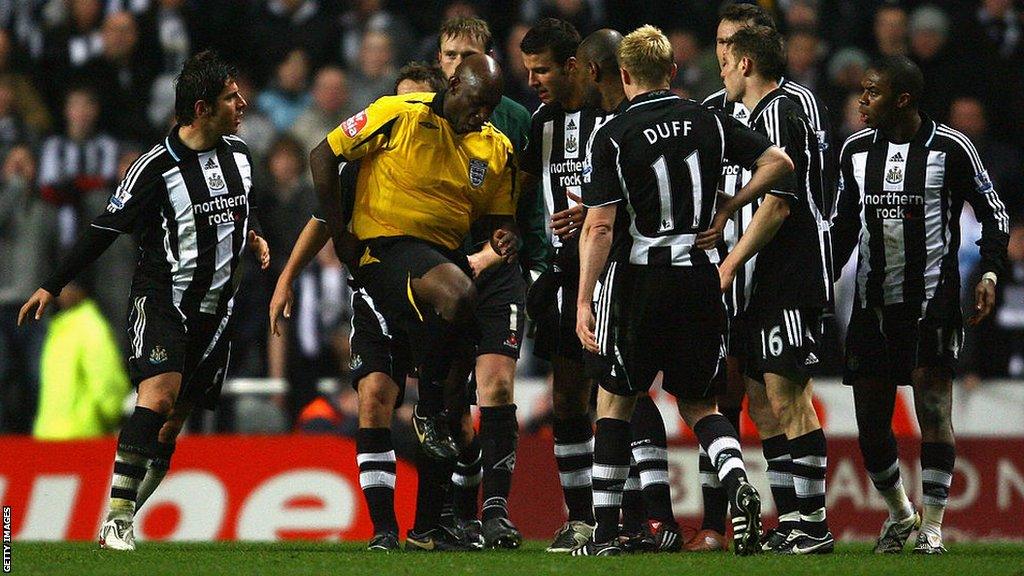Football Association issues plan to boost referee safety and diversity
- Published

Uriah Rennie was the last black referee to take charge of a Premier League game 15 years ago
The Football Association has laid out plans to recruit 50% more referees from "historically under-represented" backgrounds by 2026.
It means the governing body plans for an increase of 1,000 women referees and 1,000 black or Asian referees at all levels of football in three years.
The FA also wants to ensure those rises are reflected in the professional game.
As well as improving diversity, the FA's new strategy outlines steps for tackling the abuse of referees.
They include continuing a trial of body cameras on grassroots referees, and points deductions for teams "if their players or coaches commit repeated offences of serious misconduct".
The strategy, called 'To Grow, Guide and Govern', was released on Thursday and has four key areas:
Making refereeing an attractive career choice: Halving the time it takes to reach the top levels of the game
Improving referee experience: Initiatives including the trial of bodycams for grassroots referees to reduce abuse
Making refereeing more inclusive: A commitment to a 50% increase in referees from historically under-represented communities and a 50% increase in female referees
Enhancing referee performance and development: Investing in training and tripling online resources for referees to learn and progress.
Currently, 8% of officials are of black or Asian ethnicity, but only 3% in professional football. No black or Asian referee has taken charge of a Premier League game since Uriah Rennie's final match in 2008.
Female referees also account for 8% of officials, compared with just 2.5% in elite-level football.
The target by 2026 is to raise that to 10% in both groups.
Football anti-racism group Kick It Out said it welcomed the FA's "commitment to make refereeing a more inclusive and safe environment for women and those from traditionally under-represented groups".
"Improvement has been desperately needed in this area," it added.
Steps to boost diversity will include a new bursary fund for those from under-represented backgrounds looking to become referees.
Tackling referee abuse
Grassroots referees have been subjected to abuse in recent years, which led to a strike by Merseyside Youth Football League in protest last October.
At the time, statistics showed 380 bans had been given for attacks on grassroots officials during the previous season of 2021-22.
Points deductions and the continuing trial of bodycams are among the measures the FA said showed its commitment to "ensuring the safety and continued enjoyment of referees at all levels by reducing abuse and making referees feel truly valued on and off the pitch".
FA chief executive Mark Bullingham said: "Referees are the lifeblood of our game, so this new strategy is critical to attracting and retaining our match officials.
"We need to create a safe, inclusive and enjoyable environment for referees at all levels and to offer strong support throughout their career."

Florence Pugh interview special: The Oppenheimer star looks back at her amazing career so far
Give your brain a workout: Try these fun quizzes to test your problem-solving skills
